Prominent Rights Activist Returns To Prison After Open-Heart Surgery
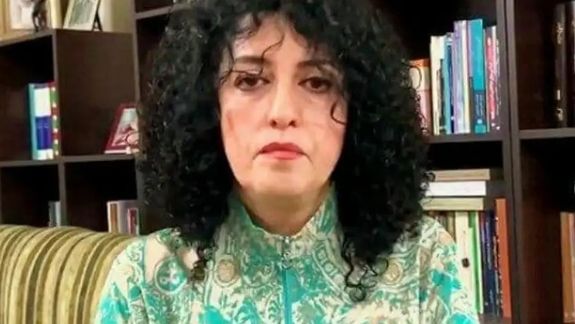
Iranian civil and human rights activist Narges Mohammadi who was on furlough for an open-heart surgery is due to return to prison.

Iranian civil and human rights activist Narges Mohammadi who was on furlough for an open-heart surgery is due to return to prison.
The prominent human rights defender will return to the notorious Gharchak (Qarchak) Prison on Tuesday to continue her sentence.
, she was sentenced to eight years in jail and 70 lashes by Branch 26 of the Revolutionary Court.
Taghi Rahmani, her husband, told Radio Farda that doctors believe she needs a longer period of recoverytime since surgeons cut through the breastbone and spread the ribs to access the heart in such operations, requiring the patient to rest for at least 6 to 12 weeks.
Mohammadi was arrested in November last year at the death anniversary of a victim shot dead by security forces during the November 2019 protests, reportedly while shopping.
In a letter from prison, Mohammadi said the court in its ruling had stated her nomination by the Norway branch of Amnesty International in March 2021 as evidence of her criminality.
She has been to jail several times over the past two decades. She was freed from Evin Prison in September 2020 after serving more than five years when she had no contact with her husband and children for long periods of time.
Persecution of human rights and political activists and executions have increased since hardliner president Ebrahim Raisi took office last August.
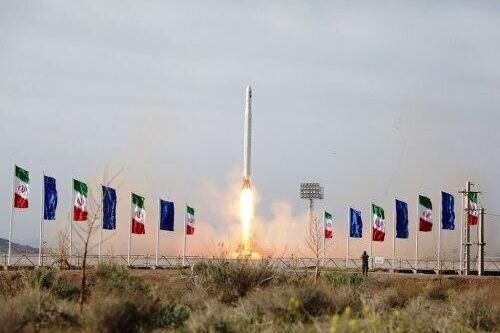
Iran’s IRGC has said they have successfully put a second military satellite into orbit, while last week satellite photos had revealed signs of a failed launch.
The announcement by the Revolutionary Guard, that needs to be verified independently, came as talks to revive the 2015 nuclear agreement known as JCPOA have paused in Vienna after last-minute snags.
Satellite images from Maxar Technologies seen by The Associated Press last week showed scorch marks at a launch pad at Imam Khomeini Spaceport in Iran's rural Semnan province on February 27.
A rocket stand on the pad appeared scorched and damaged, with vehicles surrounding it. An object, possibly part of the gantry, sat near it.
Successful launches typically don't damage rocket gantries because they are lowered prior to takeoff.
The United States has maintained that space launches by Iran could be a cover to develop intercontinental ballistic missiles that would be able to deliver nuclear warheads.
Iran, which has one of the biggest missile programs in the Middle East, has suffered several failed satellite launches in recent years due to technical issues.
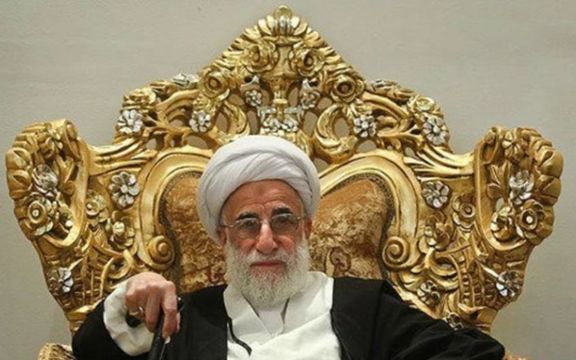
As the fate of Iran’s nuclear talks and its economy remain uncertain, a 95-year-old ayatollah has warned that the government’s ability to prevent hunger is limited.
Ayatollah Ahmad Jannati, the chairman of the Assembly of Experts, who is in the list of Iranian politicians sanctioned by the US, has spoken about the approaching Iranian New Year on March 20 and warned that “It would be a miracle if we can fill the people’s bellies.”
Jannati was echoing President Ebrahim Raisi’s call two days ago when he said the government should lift everyone from poverty in the two weeks remaining to the New Year.
The comment led to a lot of ridicule on social media by Iranians who said the Islamic Republic has plunged millions into poverty over the years and now the president wants to eliminate poverty in two weeks.
Jannati and other senior clerics appointed by Supreme Leader Ali Khamenei to constitutional bodies that control decisions and elections are seen as responsible for electoral manipulations that have narrowed popular choice even further in the past two years.
The Guardian Council in charge of vetting candidates for elections, eliminated all serious challengers to Ebrahim Raisi last June, making it all but certain that Khamenei’s choice for the post could breeze through, albeit in an election with the lowest turnout.
As Jannati called for bread for the people on the eve of the New Year, the parliament decided to hand out 1.3 million barrels of oil to government entities and individuals to export as they see fit, without a clear mechanism of accountability.
Afteb News, a Tehran website somewhat critical of the government published the headline, “Raisi’s Help to Economic Mafia” on Tuesday. It said the decision to allow various ministries and departments to enter the oil business creates the danger of massive corruption, enriching the “economic mafia” of regime insiders.
Iran’s oil and gas reserves belong to the state and the Iranian National Oil Company has always been the sole proprietor managing production and exports, even before the 1979 revolution. In the past three decades some of its operations have been ceded or leased to ‘private operators’ that are mainly quasi-state, semi-private entities owned and run by regime insiders, notably by the Revolutionary Guard.
Overall annual inflation has been hovering around 40 percent and food prices have risen much faster. Just over the weekend, the parliament eliminated a $9 billion subsidy for food imports, which will drive prices even higher local media and economists warn.
Amid these hard circumstances, the public hopes that a nuclear agreement will be reached with the United States, which can lift sanctions and at least marginally improve their livelihoods. Negotiations to restore a 2015 nuclear agreement have been going on for almost a year, so far without a result, except diplomats heralding progress on daily basis.
Raisi who assumed office last August made generous promises to the people to resolve the economic crisis with or without US sanctions. Seven months later there is little improvement, except more oil exports to China without any visible financial improvement in the government’s huge budget deficit or higher salaries for tens of millions of citizens, whose purchasing power has been wiped out by inflation.
Pundits have been warning of a social explosion in the coming months if there is no tangible improvement. So far, people from different professions including teachers have been holding protests with an increasing antigovernment mood.

Several Iranian officials say they had no contact with a female Jewish journalist who allegedly 'infiltrated' state media and befriended high-ranking officials.
Hardliner media say supporters of former President Mahmoud Ahmadinejad are behind the allegations and rumors on social media and some websites about the French-born Jewish journalist and political analyst Catherine Perez-Shakdam's alleged connections with Iranian officials to gather intelligence for Israel.
Social media has been awash with allegations that Perez-Shakdam, a Jew who converted to Shiism, gathered intelligence for Israel. A Telegram channel run by Ahmadinejad supporters recently claimed she had 'infiltrated' Iranian media and regularly contributed to Khamenei's English-language website.
Where others faced obstacles, Shakdam repeatedly appeared on the state-run English channel, Press TV, as a commentator, wrote articles for state-affiliated media including the Revolutionary Guards-linked Tasnim News Agency and even the English website of Supreme Leader Ali Khamenei.
Fantasies
Tasnim news agency Monday quoted an "informed source" that Shakdam had been in Iran a total 18 days on five visits. "The claims are journalistic fantasies and an untrue propaganda and political script," the source told Tasnim, which is linked to the IRGC. Other state media, including the official news agency IRNA, offered a similar account, citing a judicial official.
Fars news agency Sunday slammed claims that Shakdam had been a "regular contributor" to Khamenei’s website, pointing out she had just contributed a few articles and opinion pieces between 2015 and 2017.
Shakram - who has also contributed to Russian state media (with blonde hair in a picture by-line), the BBC, and the Huffingdon Post - roused the Ahmadinejad supporters with a November blog post for The Times of Israel in which she wrote she had tried to "blend in" and hide her "true motivations" when visiting Iran during the 2017 presidential election, when she interviewed Ebrahim Raisi, then a candidate.
Belly of the beast
“I nevertheless walked right into the belly of the Beast – invitation in hand, by the request of the very government whose motto calls for the death of all Jews and the annihilation of Israel,” Shakdam wrote. She said holding a French passport and her former marriage to a Yemeni Muslim gave her “a free pass to many Islamic countries.”
In the past few days Ahmadinejad supporters have also claimed that Shakdam had close or intimate relations with dozens of officials including Yadollah Javani, the managing director of the Revolutionary Guards (IRGC) weekly, Sobh-e Sadegh, and Hamidreza Moghadamfar, Deputy chief of the organization that publishes Khamenei's works and runs his website.
In a statement to the media on March 1, Javani said he never knew Shakdam or been connected with her and alluded to the allegations in a note in Sobh-e Sadegh this week in which he said enemies have targeted the IRGC to discredit it among Iranians.
Abdollah Ganji, the former managing director of another IRGC-linked publication, Javan newspaper, also wrote in Hamshahri newspaper Sunday that Shakdam could not have been an Israeli spy as claimed.
Ganji argued that an infiltrator would not learn methods of infiltration and form connections with key officials only to expose herself and the intelligence organization behind the operation for no reason.
"Where in the world will a woman establish intimate connections with a hundred people to gain their trust to extract information and spy and then destroy all the bridges after building trust?" he wrote about unsubstantiated claims of some media outlets that Shakdam has confessed to having established such relations with Iranian officials.
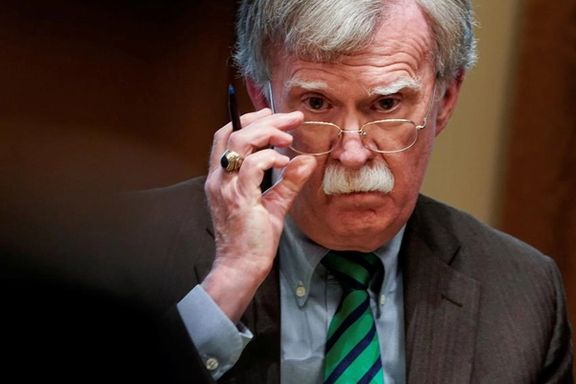
At least two agents from the Quds Force of Iran’s Revolutionary Guard have been plotting to assassinate former US national security adviser John Bolton.
The Washington Examiner quoted a Justice Department official as saying on Monday that the department possesses enough evidence to indict the Iranians but the Biden administration is resisting any public measures for fear that it could derail the Vienna negotiations with Tehran, which apparently are in final stages.
The source noted that “the seriousness of the conspiracy and the evidence warranted public indictment without delay”, adding that the IRGC also tried to recruit an assassin on US soil.
The intelligence community was aware of the plot since its early stage, and a full-time Secret Service protective detail was assigned to Bolton earlier this year or in late 2021, with significant FBI assets deployed for assistance.
The plot is also believed to have prompted national security adviser Jake Sullivan to warn Iran of severe consequences if it attacks Americans.
Iran has imposed sanctions on dozens of Americans, many of them from the US military, over the 2020 targeted killing of Qasem Soleimani, and threats have been made against former Secretary of State Mike Pompeo and other former Trump administration officials.
In January, Supreme Leader Ali Khamenei lashed out at former US president Donald Trump and others for Soleimani’s killing, saying they “will pay for their crime.”
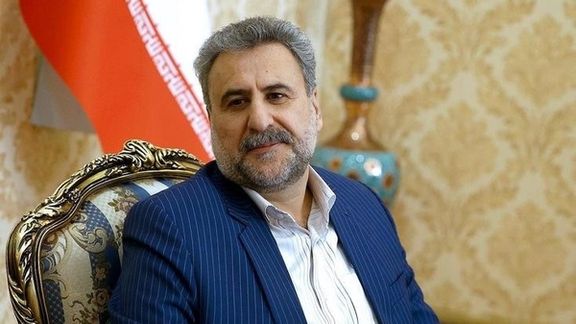
A former senior Iranian lawmaker, Heshmatollah Falahatpisheh, says the crimes of Russian President Vladimir Putin are covered up in Iran.
Falahatpisheh, the former chairman of parliament's national security and foreign policy committee, told Rouydad24 website on Monday that there could be legal action against Putin by the Rome Statute of the International Criminal Court.
He said Putin fears that if he can’t win the war, there will be a day when he and his commanders are put on trial by the Russians themselves, like what the Yugoslav people did to their political leaders.
Falahatpisheh said the prospect of this invasion is dark, because there is the ambition of a great dictator named Putin, adding that he has already played all the possible cards to keep himself in power, such as changing the constitution for lifelong rule.
He claimed that the mission of Moscow’s top negotiator in Iran nuclear talks in Vienna, Mikhail Ulyanov, was that no agreement would be signed before the invasion of Ukraine. Even after that Russians have demanded a US guarantee that Ukraine sanctions would not hurt trade with Tehran, something France calls blackmail.
Iran's top officials’ including Supreme Leader Ali Khamenei and President Ebrahim Raisi have expressed support for the Russian invasion of Ukraine blaming the United States for the crisis while hundreds of Iranians on social media have been expressing anger at the invasion and criticizing the government’s position.